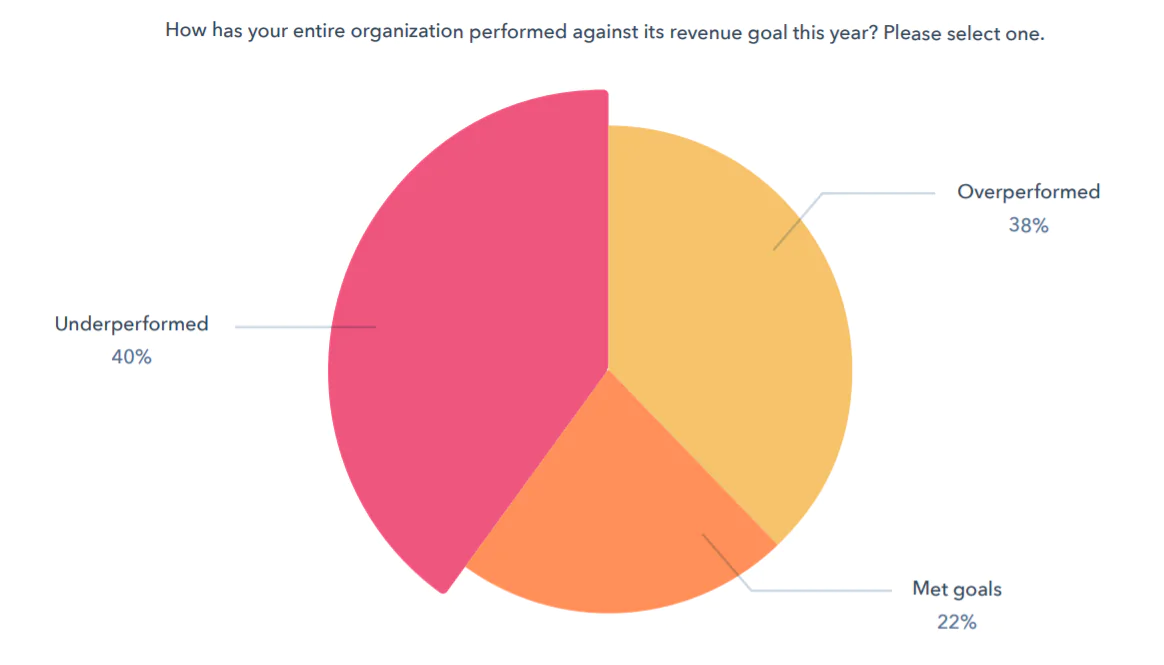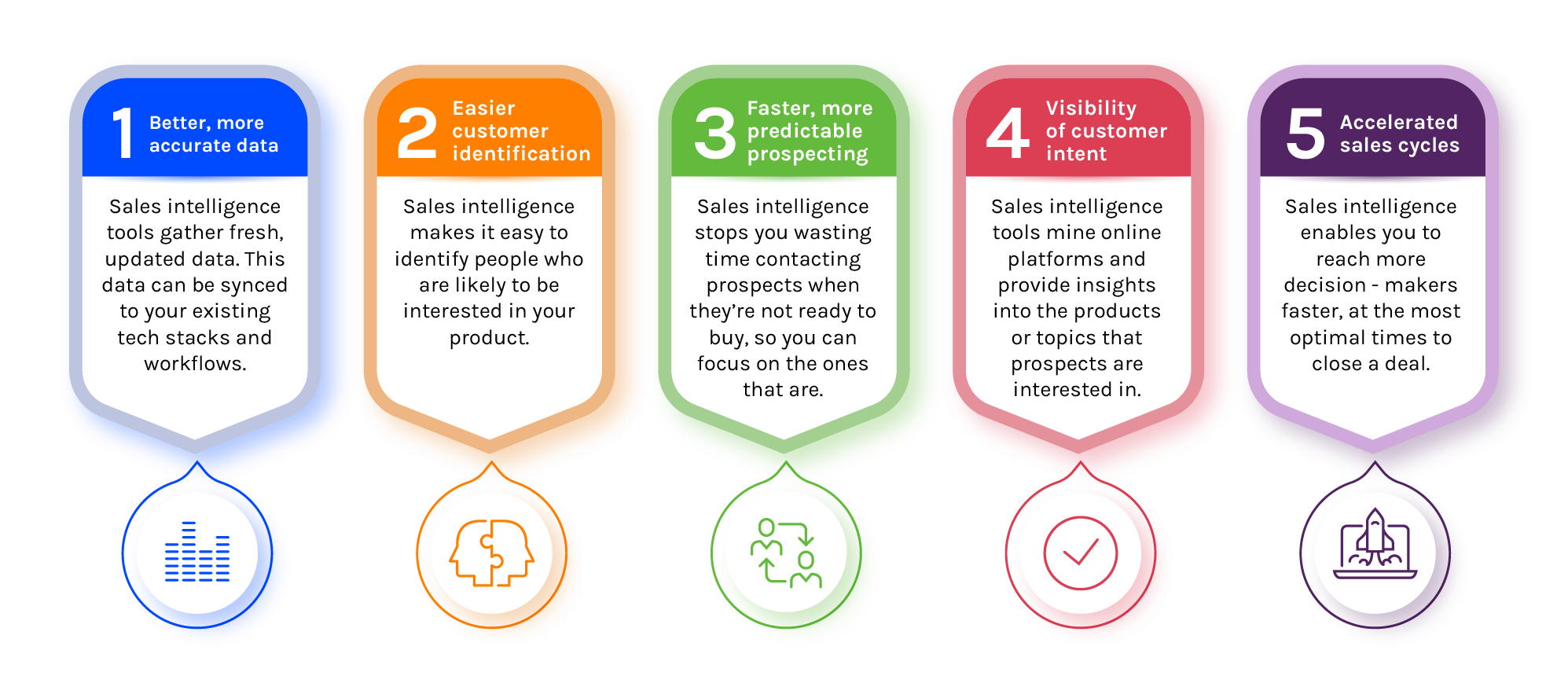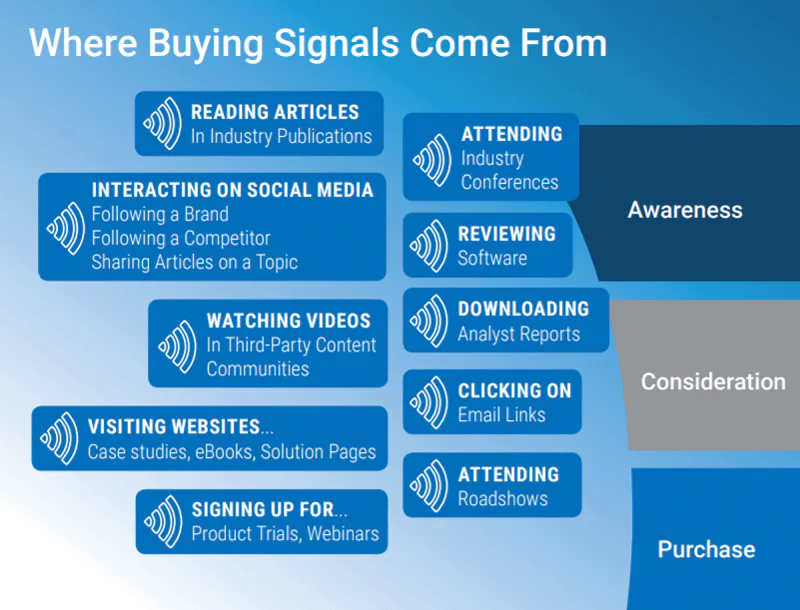2 out of 5 businesses failed to meet their revenue goals in 2020. Revenue comes from sales and failure to hit revenue goals is a failure of your sales strategy.
Alt text: revenue targets
Source: HubSpot
And that’s why every complex sales process needs constant re-evaluation. For large companies, dealership networks, or multi-location businesses, things get maddening when great marketing campaigns result in leads contacting your local sales reps but ultimately buying from the competition. As the market becomes increasingly competitive and consumers become pickier with their choices, this struggle will only increase in the future.
One way of putting an end to this issue is through using evolving tech and tools to boost your sales. Of course, tools rely on data. In this case, sales intelligence data.
Today’s consumers expect a highly personalized approach when they are being sold a product or service. They’re influenced by a brand’s pitch only if every interaction is relevant to them at an individual level.
Having the right information about your leads is crucial. Leveraging this information can help you beat the competition by addressing your prospects’ concerns at every touchpoint.
This is where sales intelligence data comes in.
Key Takeaways:
- Sales intelligence is an attempt to enable sales reps to make informed decisions based on data.
- Sales intelligence data helps you build a targetable customer profile and gauge their intent at various stages in the buyer’s journey.
- You can sustain revenue growth by increasing average order value (AOV) and customer lifetime value (CLV) if you have access to a steady stream of actionable sales data.
What Is Sales Intelligence?
Today, every individual and company has a digital footprint. Chances are, your ideal customer isn’t any different.
Yet, combing the internet for hours to find the most relevant data available can be a time-intensive and cumbersome process.
Sales intelligence consists of technologies that make this job easier by automating the process of gathering information from multiple data sources and channels available online. With the right sales intelligence solution, collecting, organizing, analyzing, and monitoring prospect data becomes effortless.
How does sales intelligence technology work, then?
These days, many sales intelligence tools work by fusing artificial intelligence (AI) with the sales process. They use AI-based crawlers that tap into multiple online sources to gather all possible information on a dataset of leads that you define. This data then gets deposited into a database and formatted and organized in a manner that your sales reps can use for analysis and further action.
Sales intelligence provides reps with a variety of information that helps with
- B2B audience targeting
- Audience engagement
- Lead generation
- Lead segmentation
- Lead qualification
- Personalization of the buyer journey
- Enrich CRM and sales engagement systems
- Account-Based Marketing (ABM)
- Sales-marketing alignment
But you could do all these things without sales intelligence data, too, right? No, not really. Not today.
Without sales intelligence, you need leads to show up at your door to collect the right information about them – you can’t go mine an audience for data. Your process is riddled with uncertainties – Marketing sends prospects to your sales reps; they try pitching, succeed some of the time and fail at others, try better strategies, and improve their performance accordingly.
Sales intelligence completely eliminates this need for trial and error. With sales intelligence software, your sales reps do not have to spend time collecting data on Marketing Qualified Leads (MQLs) or running checks on them before they can be qualified as Sales Accepted Leads (SALs). This is a significant problem – studies estimate that sales reps spend just 33% of their time conducting actual sales.
When you have all the relevant data about your prospects at your fingertips, you can understand the what, why, how, and when behind their buying decisions. You can use this data to tweak your pitches and accelerate your sales cycle.
Alt text: benefits of sales intelligence
Source: Cognism
No surprise then that the global market for sales intelligence is valued at over $2 billion and growing at a CAGR of over 10%.
How can you be an early adopter and use sales intelligence data to steal a march over your competition?
1. Enrich Your Data
A major problem with data is that it is difficult to maintain and utilize. You can extract and pull data from a zillion sources but organizing it is a different ball game. If your databases are sloppy, you’re killing your sales reps’ enthusiasm to a large extent.
Sales intelligence data makes sure you have a reliable basis for scoring, qualifying, and prioritizing leads. How? Because the data you gather is
- Complete – you have as many details about your prospect as possible, all in one place
- Accurate, validated (preferably from multiple sources), and updated
- Accessible in a ready-to-use format
This ensures your sales reps reach out to the right people (decision-makers instead of gatekeepers), equipped with the right information and resources, with targeted and personalized messages.
2. Build Your Ideal Customer Profile
Building an Ideal Customer Profile (ICP) is a fundamental step in lead gen, qualification, and nurturing. Companies that have a well-researched ICP have 68% higher win rates than those that don’t.
However, a traditional ICP is not sufficient to keep up with today’s fast-paced market where static demographic data is merging with dynamic firmographic and technographic data.
Sales intelligence data adds to the accuracy of your ICP with the following information about them:
- Company size
- Area of operations
- Intent drivers
- Purchase triggers
- Content consumed
- Technology deployed
Ultimately, this enables your sales reps to identify and prioritize high-value leads more efficiently and target them with suitable messaging.
3. Enhance Sales Prospecting
Talking of targeting with “suitable” messaging, sales intelligence data is all about getting into the mind of your buyers and understanding the what, why, how, and when behind their purchase decisions. If you’re able to gauge customers’ intent with a fair amount of confidence, you can use the best possible methods to approach and pitch them.
Based on intent data, sales intelligence software can be configured to alert you with “buying signals” whenever a prospect shows the possibility of becoming a customer. This means that your sales reps can focus exclusively on hot leads that have a higher chance of converting with the gentlest of nudges.
For example, if a prospect’s company has recently raised a round of funding and they’re hiring specialists in your industry, it means they might need (and have money to spend on) your product. Using this combination as a trigger, your sales rep can reach out to the right person (again, based on data) for a friendly talk.
Source: Socedo
A comprehensive sales intelligence dataset lets you personalize your pitches to a great extent, have more intelligent, ongoing conversations with leads, and foster lasting bonds with customers to retain them for a long time.
4. Identify Cross-Selling and Upselling Opportunities
Cross-sells can increase your sales by 20% (and profits by 30%). Upsells do about the same. Cross-selling and upselling to your existing clientele are crucial for building a loyal customer base and sustaining profits.
Sales intelligence data lets you focus on existing customers as much as it lets you analyze and keep track of leads. As with leads, your customers give off strong buying signals. If anything, you already have data on them in your CRM and sales engagement platform – you only need to leverage these buying signals to improve their experience every time.
5. Acquire Key Competitor Insights
Business success is not just about selling as much as possible or hitting your revenue goals. Business continuity, mind share, and market share are paramount – in that order. You want to keep tabs on your competitors’ tactics to stay ahead of them at all times.
Competitive intelligence software can provide you with crucial intel such as the expiration date of one of a big prospect’s contract with a competitor. Using this data, you can woo your ideal customers away from your competitors by showing the benefits of your USP, solving their problems in a better way, or offering a plain old sweeter deal.
Machine learning (ML) algorithms used in sales intelligence tools help you
- Identify new competitors in real-time based on predefined criteria and add them to your tracking list
- Monitor competitors’ actions and campaigns, find patterns, and deduce their marketing and sales strategies
- Analyze historical data of competitors and compare it with market research, benchmarks, and industry trends
Sales Intelligence Is the Future of Smart Selling
Every market and industry is growing more competitive by the day. Personalization and data dependency now form the foundation of the sales process. Consequently, sales intelligence is perhaps the only key to unlocking your revenue targets.
As businesses expand their sales activities across multiple locations using different distribution and retail channels, data collection, centralization, sharing, and accessibility are becoming challenging processes. This frequently leads to glaring inconsistencies in customer experience and creates gaps in the sales process where leads fall off.
With sales intelligence data, sales professionals have validated and updated datasets at their fingertips that empower them to close leads without duplication of effort.
Want to get started with sales automation and build your own sales intelligence process? Schedule a demo now to discover how data-driven engagement and lead nurturing can work for you.
Featured image: Pexels








